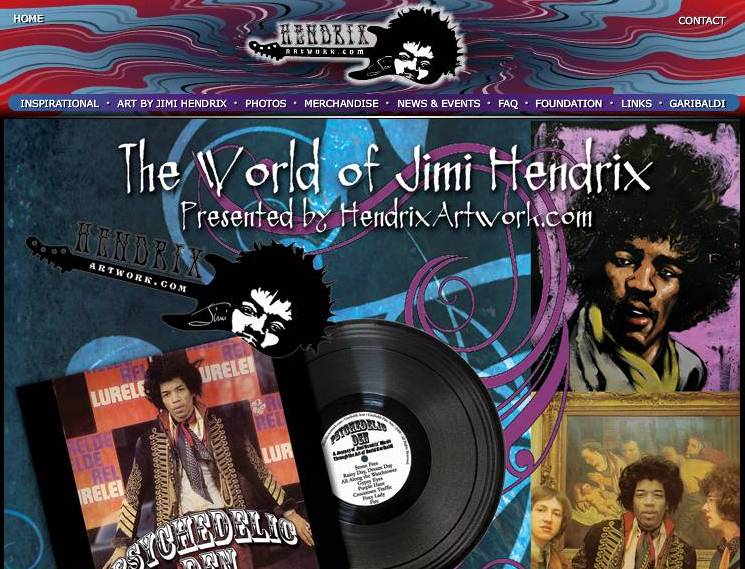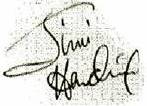Court Enters Judgment for Perfumer's Workshop Based on Fees Award
On July 13, the Western District entered judgment in favor of The Perfumer’s Workshop International, Ltd., against Sportsfragrance, Inc.
As readers may recall, Sportsfragrance sued Perfumer’s for trademark infringement on claim that Perfumer’s use of ROCK & ROLL in connection with its perfumes infringes Sportsfragrance’s ROCK ‘N ROLL mark in connection with perfumes. In May, Judge Thomas Zilly dismissed the suit for lack of personal jurisdiction (STL coverage here).
The judgment stems from the court’s June 30 order granting in part and denying in part Perfumer’s motion for attorney’s fees under Washington’s long-arm statute, RCW 4.28.185(5). The court awarded $12,685.88 but denied the request for fees incurred defending against Sportsfrangrance’s motion for fees for failure to waive service, time spent on a dispositive motion that was never filed, and time defending against a motion for preliminary injunction. The court reduced the remaining amount by 25 percent to represent the effort expended on the venue basis for Perfumer’s alternative motion to dismiss relative to the long-arm jurisdiction basis.
The case cite is Sportsfragrance, Inc. v. The Perfumer’s Workshop International, Ltd., No. 09-177 (W.D. Wash. June 30, 2009) (Zilly, J.).
Full disclosure: STL was one of the lawyers representing Perfumer’s.
Bainbridge Island Design Firm Claims Amazon.com Infringes Its Trademark
Seattle’s technology news blog TechFlash ran a story on Friday about a Bainbridge Island, Wash.-based design firm that claims Amazon.com is infringing its trademark.
The dispute involves Web designer Geoffrey Daigle’s registration for WINDOW SHOPPING for “information services, namely, providing information on a wide variety of topics, namely news, weather, arts, counseling services, automobiles, childcare, consumer products, sports, travel, and entertainment, namely, movies, videos, and music via a global computer network.” Mr. Daigle’s firm, Daigle Design, uses the mark in connection with a Web portal to Amazon.com and other retailers.
At issue is Amazon.com’s recent adoption of AMAZON WINDOWSHOP in connection with a beta online shopping feature that enables users to zoom in on items and view them in 3-D.
Daigle Design sent Amazon.com a cease-and-desist letter in February, the post says. Amazon.com reportedly responded by claiming that WINDOW SHOPPING is generic.
In January, Amazon.com filed its own application to register AMAZONWINDOW SHOP and Design.
The post quotes me as saying it’s unusual for a small company to go after a behemoth like Amazon.com.
No word on whether Mr. Daigle intends to file suit.
Additional coverage yesterday in the Kitsap Sun.
Western District Holds Maker of Worm Composting Products in Contempt
As STL reported in November, the Western District found that defendants Providnet Co. Trust and Barry Russell likely infringed plaintiff Cascade Manufacturing Sales, Inc.’s trademark rights in WORM FACTORY in connection with the sale of worm composting bins, and imposed a preliminary injunction against them.
On Jan. 7, the court clarified that its injunction extended to the phrase “Factory of Worms” as well as “Worm Factory,” but not “Worm Wrangler,” which both parties use to describe their products. The court also cautioned defendants to comply with its earlier order.
Apparently, defendants failed to do so. On July 2, Judge Ronald Leighton found them to be in contempt. The court imposed a $5,000 fine, which it said it would exonerate if defendants demonstrate they have met the following terms by July 13. In summary, defendants must:
- Send a letter to each of their distributors mandating that they stop using the phrase “Worm Factory,” “Factory of Worms” or other such terms in connection with defendants’ products;
- Remove all references to “factory” in tags, product descriptors, meta tags, or any other materials on defendants’ Amazon and eBay stores;
- Remove all references to “factory” on their Web sites; and
- Remove “factory” from their accounts on each keyword advertising medium that they use.
I’m happy to report that western Washington appears to be Worm Central, with all parties in the case hailing from this neck of the woods.
The case cite is Cascade Manufacturing Sales, Inc. v. Providnet Co. Trust, No. 08-5433 (W.D. Wash. July 2, 2009).
Western District Finds Use of Hendrix Name Fair But Use of Signature Infringing
 Screen shot from defendants’ former Web site depicting Hendrix mark
Screen shot from defendants’ former Web site depicting Hendrix mark
Defendants’ use of HENDRIX and JIMI HENDRIX was fair use of plaintiffs’ trademarks to describe the images depicted on their products, the Western District preliminarily found on July 2. However, the court also found defendants’ domain names containing those marks, a guitar and “headshot/bust” logo, and Jimi Hendrix’s signature infringe plaintiffs’ trademarks and enjoined further use pending trial.
Defendant Andrew Pitsicalis was formerly associated with Craig Dieffenbach and Electric Hendrix, LLC — defendants the court enjoined from using various JIMI HENDRIX trademarks in connection with the sale of vodka (STL discussion of that case here). In 2008, Mr. Pitsicalis formed HendrixLicensing.com LTD, which markets posters, art prints, apparel, and novelty items bearing the name, signature, likeness, and/or art created by Jimi Hendrix.
Plaintiffs Experience Hendrix, LLC, and Authentic Hendrix, LLC, sought a preliminary injunction against the defendants’ use of their trademarks by maintaining the hendrixlicensing.com and hendrixartwork.com domain names; using a guitar and “headshot/bust” logo; incorporating the HENDRIX and JIMI HENDRIX trademarks in various products; and placing Mr. Hendrix’s signature on various products. (Past STL discussion of the case here.)
After receiving the motion, defendants stopped using the domain names, as well as the guitar and “headshot/bust” logo, and did not dispute the infringing nature of those things. Defendants solely argued they are making fair use of Jimi Hendrix’s name and signature.
The court agreed in part and disagreed in part. With respect to use of the HENDRIX and JIMI HENDRIX names, the court leaned heavily on the the case of Cairns v. Franklin Mint Co., 292 F.3d 1139 (9th Cir. 2002), in finding the use was fair. “To the extent the names ‘HENDRIX’ or ‘JIMI HENDRIX’ serve merely to describe the associated image, i.e., to identify plaintiffs’ ‘product’ Jimi Hendrix, who is depicted within, or whose artwork is shown in, defendants’ posters or other products, the use is analogous to that in Cairns. As in Cairns, plaintiffs have no post-mortem rights of publicity, and they cannot preclude anyone from creating and then selling sketches, portraits, caricatures, dolls, bobbleheads, or other likenesses of Jimi Hendrix. In addition, plaintiffs offer no evidence that they have trademarks or service marks incorporating fonts similar to the stylized lettering used by defendants, except for Jimi Hendrix’s signature, which will be discussed in the next section. Other than the signature, plaintiffs’ registrations for ‘HENDRIX’ and ‘JIMI HENDRIX’ are in plain typeface. Thus, defendants’ use of distinctive lettering does not itself inappropriately imply a relationship with plaintiffs.”
 With regard to Mr. Hendrix’s signature, the court found defendants’ use was not fair. “Defendants have represented to the Court that the signature is authentic, was purchased on ‘eBay’ by Craig Dieffenbach, and was conveyed in electronic form to Mr. Pitsicalis. Defendants use the signature on products, for example, dart game accouterments such as targets, score boards, and dart flights, containing no likeness of Jimi Hendrix. During oral argument, counsel for defendants indicated that defendants are now confining their use of the signature to posters, fine art prints, and apparel. The Court interprets counsel’s remark as a concession that defendants’ use of Jimi Hendrix’s signature constitutes branding, and it is not exempted from infringement liability by either the nominative or the classic fair use doctrine.”
With regard to Mr. Hendrix’s signature, the court found defendants’ use was not fair. “Defendants have represented to the Court that the signature is authentic, was purchased on ‘eBay’ by Craig Dieffenbach, and was conveyed in electronic form to Mr. Pitsicalis. Defendants use the signature on products, for example, dart game accouterments such as targets, score boards, and dart flights, containing no likeness of Jimi Hendrix. During oral argument, counsel for defendants indicated that defendants are now confining their use of the signature to posters, fine art prints, and apparel. The Court interprets counsel’s remark as a concession that defendants’ use of Jimi Hendrix’s signature constitutes branding, and it is not exempted from infringement liability by either the nominative or the classic fair use doctrine.”
Since neither doctrine applied, the court found defendants’ use of Mr. Hendrix’s signature was likely to cause confusion — an issue defendants did not address. Therefore, the court concluded the requested injunction was appropriate.
The case cite is Experience Hendrix, LLC v. HendrixLicensing.com, LTD, No. 09-285 (W.D. Wash. July 2, 2009) (Zilly, J.).
Ninth Circuit Adopts Standard for Recalls in Trademark Infringement Cases
On July 2, the Ninth Circuit decided that a district court must find a “substantial risk of danger to the public” or other special circumstances before entering a preliminary injunction requiring a product recall in a trademark case.
In Marlyn Nutraceuticals Inc. v. Mucos Pharma GMBH & Co., plaintiff Mucos argued that its former distributor’s use of Mucos’ WOBENZYM registered trademark in connection with enzyme products that differed from Mucos’ formula confused consumers and infringed its trademark rights. Marlyn argued it had a right to manufacture and sell enzyme products under the WOBENZYM mark pursuant to an informal agreement between the parties. The District of Arizona disagreed. It granted Mucos’ motion for a preliminary injunction and ordered Marlyn to stop manufacturing and distributing its WOBENZYM-branded products, recall its already-distributed products, and provide restitution to the affected customers.
Marlyn appealed, challenging, among other things, the scope of the injunction. The Ninth Circuit adopted the Third Circuit’s standard for imposing recalls, which requires the plaintiff to meet the higher standard for a disfavored “prohibitory injunction,” and for the district court to consider: “(1) the willful or intentional infringement by the defendant; (2) whether the risk of confusion to the public and injury to the trademark owner is greater than the burden of the recall to the defendant; and (3) substantial risk of danger to the public due to the defendant’s infringing activity.”
The court then sent the case back to the district court to consider these factors. “As the district court did not have the benefit of this decision when deciding this case, it did not analyze these additional factors. It did, however, rest its recall decision in part on the third factor — substantial risk of danger to the public due to the defendant’s infringing activity — in concluding that there was a public health hazard in allowing the product to remain on the market. However, the record does not support the existence of a public health risk necessary to invoke the interlocutory remedy of product recall. The only record support for the proposition that Marlyn’s Wobenzym is unsafe for public consumption is the testimony of Dr. Scavetta that the proteolytic activity in some batches of Marlyn’s Wobenzym was 250% greater than what it should have been. However, Scavetta did not testify that this formulation was unsafe for human consumption. Moreover, the district court stated that it did not find Dr. Scavetta’s testimony to be credible. There was no other testimony or evidence upon which the district court could make its conclusion that the product was hazardous for public consumption.”
The case cite is Marlyn Nutraceuticals, Inc. v. Mucos Pharma GMBH & Co., No. 08-15101, __ F.3d. __, 2009 WL 1886172 (9th Cir. July 2, 2009).